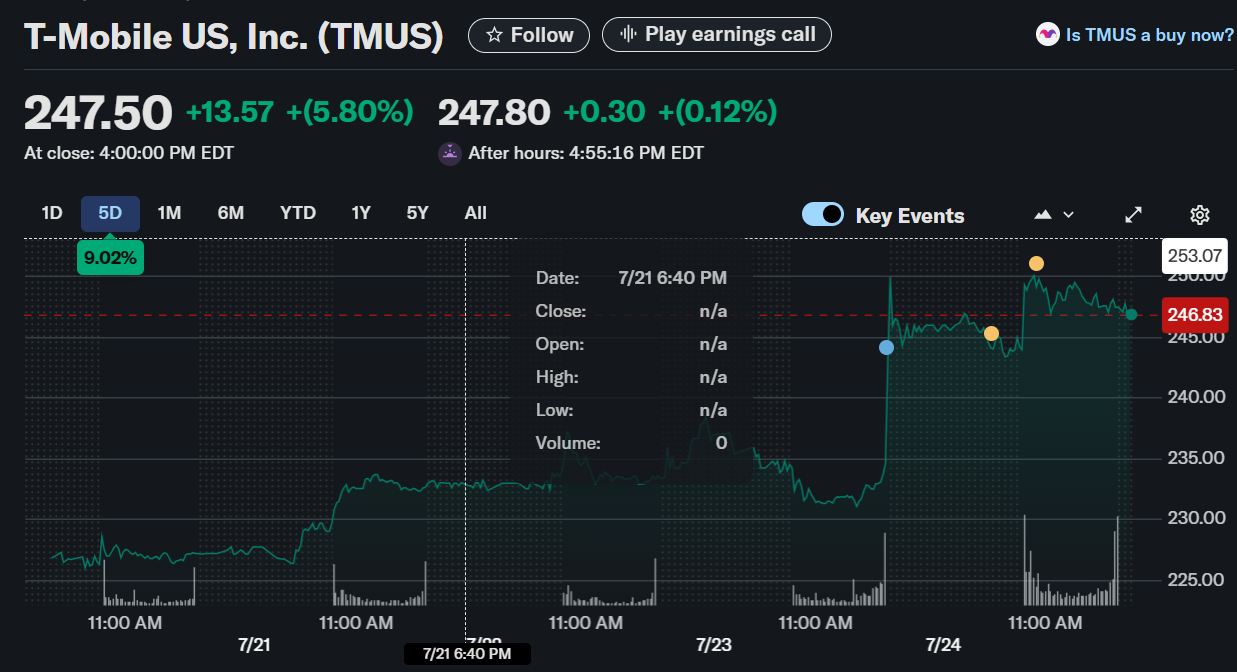TLDR
- T-Mobile shares rose 6.52% to $249.19 after reporting record Q2 growth.
- Q2 EPS of $2.84 beat estimates; revenue up 6% to $17.4 billion.
- Postpaid phone additions hit 830,000; internet customers up 454,000.
- ARPA saw best growth in eight years, driven by new plans.
- Full-year guidance raised across net additions and free cash flow.
T-Mobile US Inc. (NASDAQ: TMUS) posted strong second-quarter results on July 23, 2025, pushing the stock up 6.52% to $249.19.

Diluted earnings per share rose 14% to $2.84, topping estimates of $2.69. Revenue climbed 6% year-over-year to $17.4 billion, slightly exceeding Wall Street forecasts. The company achieved record growth across key metrics, underscoring its momentum in the wireless and broadband markets.
Customer Growth and Revenue Drivers
The company added 830,000 new monthly phone subscribers in Q2, reinforcing its lead in postpaid phone net additions. T-Mobile raised its full-year outlook for total postpaid net additions to 6.1–6.4 million, and for postpaid phone net additions to 2.95–3.1 million. Average Revenue per Account (ARPA) grew over 5%, the highest in eight years, helped by April’s launch of new rate plans and rising adoption of premium offerings.
Service revenue increased by 6% year-over-year, while core adjusted EBITDA also rose by 6%. Adjusted free cash flow reached $4.6 billion, an all-time Q2 high. For the full year, free cash flow guidance has been lifted to $17.6–$18 billion.
Network Expansion and Strategic Moves
T-Mobile continues to invest in its network with plans to add nearly 4,000 new sites in 2025. It also launched a $10-per-month satellite texting service that addresses coverage gaps in underserved areas. Despite strong growth, churn rates were slightly elevated in Q2, though the company expects them to stabilize by year-end.
The company highlighted new business group records, driven by strong net additions and a new cable partnership in the SMB segment. It is also expanding into rural markets, although perceptions of its network still lag behind competitors. T-Mobile’s integration of USCellular is ongoing and requires time and capital to fully realize benefits.
Broadband Expansion and Fiber Ambitions
The company’s broadband business added 454,000 high-speed internet users during the quarter. T-Mobile also announced a joint venture with KKR & Co. to acquire Metronet, a fiber-optic internet provider.
Though its fiber expansion trails rivals in scale, the deal positions T-Mobile to grow its wireline footprint.
Performance Overview
As of July 24, 2025, TMUS has outperformed the broader market across multiple time frames. Its YTD return stands at 13.69%, well ahead of the S&P 500’s 8.43%. Over one year, it gained 42.84% versus the S&P’s 17.51%.
TMUS posted a 93.06% return over three years and an impressive 143.74% over five years, compared to the S&P’s 98.33%. The figures reflect sustained momentum and investor confidence in T-Mobile’s long-term strategy.








